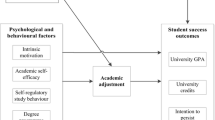Abstract
A cross-sectional study of McGill management certificate students investigated the benefits adults experience through continuing education. Four groups totalling 1,234 students were surveyed: entrants, graduates, alumni, and a group who had voluntarily withdrawn. Analysis of benefits anticipated by entrants provided a framework of six categories of benefits: career development, fulfilling external requirements, personal development, networking, gaining knowledge and personal fulfilment. The benefits reported by graduates match the goals of entrants, but the relative importance of the various benefits appears to change during the program. For entrants, career development ranks first as the primary motivation, while more of the graduates focus on personal development, and personal fulfilment. Both entrants and graduates emphasize the importance of gaining knowledge. The results were interpreted in terms of the empowerment provided by continuing education.
Interesting differences by various student characteristics were explored. Although equally satisfied with the program's contribution to career development, women report slower advancement than men. Further differences by gender are that women experience more personal development and personal fulfilment. While there are no significant differences by age, students with no prior university education report higher gains in several areas. Knowledge gained, however, is highly valued regardless of prior education. It is those with several years of work experience and those who are most certain of their goals who report acquiring more knowledge than others. These findings have implications for admissions policy, program delivery and design, and support services.
Similar content being viewed by others
References
Boshier, R. and Collins, J.B. (1985). The Houle typology after twenty-two years. Adult Education Quarterly, 35, 113–130.
Clark, F. (1990). Benefits adults attribute to their participation in a university continuing education management certificate program. Unpublished master's thesis, McGill University, Montreal.
Cross, K.P. (1981). Adults as learners: Increasing participation and facilitating learning. San Francisco: Jossey-Bass.
David-Kredl, P. (1989). Women's higher education: A dilemma of choices. The McGill Journal of Education, 24, 159–172.
Direction générale de l'enseignement et de la recherche universitaires (1988), Relance à l'université, 1987: Promotion de l'année 1985. Québec: Gouvernement du Québec, Ministère de l'Enseignement supérieur et de la Science.
Ewell, P.T. (1983). Student outcomes questionnaires: An implementation handbook (2nd ed.). Boulder, CO: NCHEMS Publications.
Forrester, G.C., Jones, G. and Dennison, J.D. (1983). A longitudinal follow-up survey of students from career/technical programs in British Columbia community colleges and institutes: Technical Report. Vancouver: B.C. Research. (ERIC Document Reproduction Service No. ED 238 472).
Harshman, C.L. (1979). The impact of the non-traditional degree. In A.B. Knox (Ed.), Assessing the impact of continuing education, (pp. 55–61). New directions for continuing education, no. 3. San Francisco: Jossey Bass.
Ironside, D.J. and Carley, R.J. (1986). An open door is not enough: A report of a survey of support services for adult learners in universities. Canadian Journal of Continuing Education, 12(2), 3–20.
Kember, D. (1989). A longitudinal process model of drop-out from distance education. Journal of Higher Education, 60, 278–301.
Knowles, M. (1973). The adult learner: A neglected species. Houston: Gulf Publishing Company.
MacNamara, M., Meyler, M. and Arnold, A. (1990). Management education and the challenge of action learning. Higher Education, 19, 419–433.
Mishler, C.J. (1983). Adult's perception of the benefits of a college degree. Research in Higher Education, 19, 213–230.
Morstain, B.R. and Smart, J.C. (1974). Reasons for participation in adult education courses: A multivariate analysis of group differences. Adult Education, 24(2), 83–98.
Renkiewicz, N.K. and Bower, C.P. (1977). Student outcomes questionnaires: Community College Series. Boulder, CO: NCHEMS Publications.
Springett, N.R. (1986). Course satisfaction and occupational ego-identity among undergraduates. Higher Education, 15, 323–331.
Terenzini, P.T. (1982). Designing attrition studies. In E.T. Pascarella (Ed.), Studying student attrition, (pp. 55–71). New directions for institutional research, no. 36. San Francisco: Jossey Bass.
West, L.H.T. and Hore, T. (1989). The impact of higher education on adult students in Australia: Part 1. Employment. Higher Education, 18, 341–352.
West, L.H.T. and Hore, T. (1989). The impact of higher education on adult students in Australia: Part 2. The person. Higher Education, 18, 473–483.
Author information
Authors and Affiliations
Rights and permissions
About this article
Cite this article
Clark, F., Anderson, G. Benefits adults experience through participation in continuing higher education. High Educ 24, 379–390 (1992). https://doi.org/10.1007/BF00128453
Issue Date:
DOI: https://doi.org/10.1007/BF00128453




